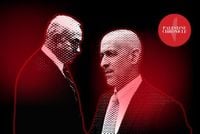In a dramatic escalation of tensions between Israel's Prime Minister Benjamin Netanyahu and the head of the Shin Bet domestic security agency, Ronen Bar, serious allegations have emerged that could shake the very foundations of Israeli governance. Bar, in a sworn affidavit submitted to the High Court of Justice on April 21, 2025, accused Netanyahu of demanding personal loyalty and pressuring him to surveil anti-government protesters, a move seen by many as a significant threat to democracy.
Bar's affidavit, which spans 31 pages and includes five appendices, details a troubling narrative of political interference and intimidation. According to Bar, Netanyahu explicitly instructed him that in the event of a constitutional crisis, he must prioritize obedience to the prime minister over the High Court of Justice. "It was made clear to me that if a constitutional crisis arises, I must obey the prime minister and not the high court," Bar stated in his document, highlighting the gravity of the situation.
The internal security chief's claims come in the wake of a cabinet decision to dismiss him, a move that sparked widespread protests throughout Israel. The Supreme Court intervened on April 8, urging the government and the attorney general to find a compromise regarding Bar's position, which has since become a focal point of public scrutiny.
Among the most alarming allegations in Bar's affidavit is his assertion that Netanyahu sought to use the Shin Bet's resources to monitor Israeli citizens involved in protests against his government. Bar claimed that Netanyahu asked him on multiple occasions to provide details about the identities of protest leaders and funders, stating, "Netanyahu repeatedly requested that the Shin Bet act against civilians involved in protests and demonstrations." Bar emphasized that he refused these requests, maintaining that they violated the principles under which the Shin Bet operates.
Furthermore, Bar detailed attempts by Netanyahu to influence his testimony in an ongoing corruption trial, stating that he faced "exceptional and repeated pressure" to alter his professional opinion regarding the security situation in Israel. This pressure reportedly included a demand for Bar to sign a document that would delay Netanyahu's testimony, a request he ultimately rejected.
In a striking revelation, Bar asserted that Netanyahu's office had presented him with a document intended to prevent the prime minister from spending extended periods in publicly known locations, effectively hindering his ability to testify. Bar's resistance to these demands has been framed by the prime minister's office as a lack of trust, with Netanyahu publicly stating that he had lost faith in Bar's capacity to lead the Shin Bet.
The backdrop to this conflict is the October 7, 2023, Hamas attack, which resulted in the deaths of over 1,200 people and the abduction of 251 individuals. Following this tragedy, Bar authorized Shin Bet to open investigations into Netanyahu's close aides, particularly concerning allegations of financial ties to Qatar, a country that has been accused of funding Hamas. This decision reportedly intensified the animosity between the two leaders.
Bar's affidavit also addresses the internal investigation conducted by Shin Bet regarding the October 7 events, asserting that the agency's actions were not responsible for the failure to prevent the attack. He stated, "The actions taken by the Shin Bet overnight did not lead the security system to thwart the murderous attack that had been meticulously planned over many years," countering claims from Netanyahu's camp that he had failed in his duties.
The public and legal implications of Bar's affidavit are profound. With allegations of political interference in national security operations, the case raises critical questions about the integrity of Israel's democratic institutions. Opposition leader Yair Lapid has seized upon Bar's claims, asserting that they demonstrate a clear danger to Israeli security posed by Netanyahu's leadership.
In response to Bar's allegations, Netanyahu's office has vehemently denied the claims, labeling the affidavit as "full of lies" and asserting that Bar's failures on October 7 justify his dismissal. The prime minister's allies have echoed these sentiments, insisting that Bar's actions warrant scrutiny and questioning his credibility.
The Supreme Court's involvement in this matter underscores the judiciary's role as a check on executive power, particularly in a climate where allegations of authoritarianism are becoming increasingly prevalent. The court's decision on Bar's dismissal will not only impact his future but also set a precedent for the independence of security agencies in Israel.
As the situation unfolds, the public is left grappling with the implications of these revelations. Bar has indicated that he plans to resign, but his motivations appear to extend beyond personal interests; he emphasizes the need for accountability and transparency within the Israeli government.
In the coming days, the government is expected to submit its response to Bar's affidavit, and the political landscape in Israel may very well hinge on the outcome of this legal battle. With both sides digging in their heels, the stakes have never been higher for the future of Israeli democracy and the integrity of its institutions.
In light of these developments, many are left wondering: What does this mean for the future of governance in Israel? Will the rule of law prevail, or will political expediency dictate the course of events in this increasingly polarized nation?









